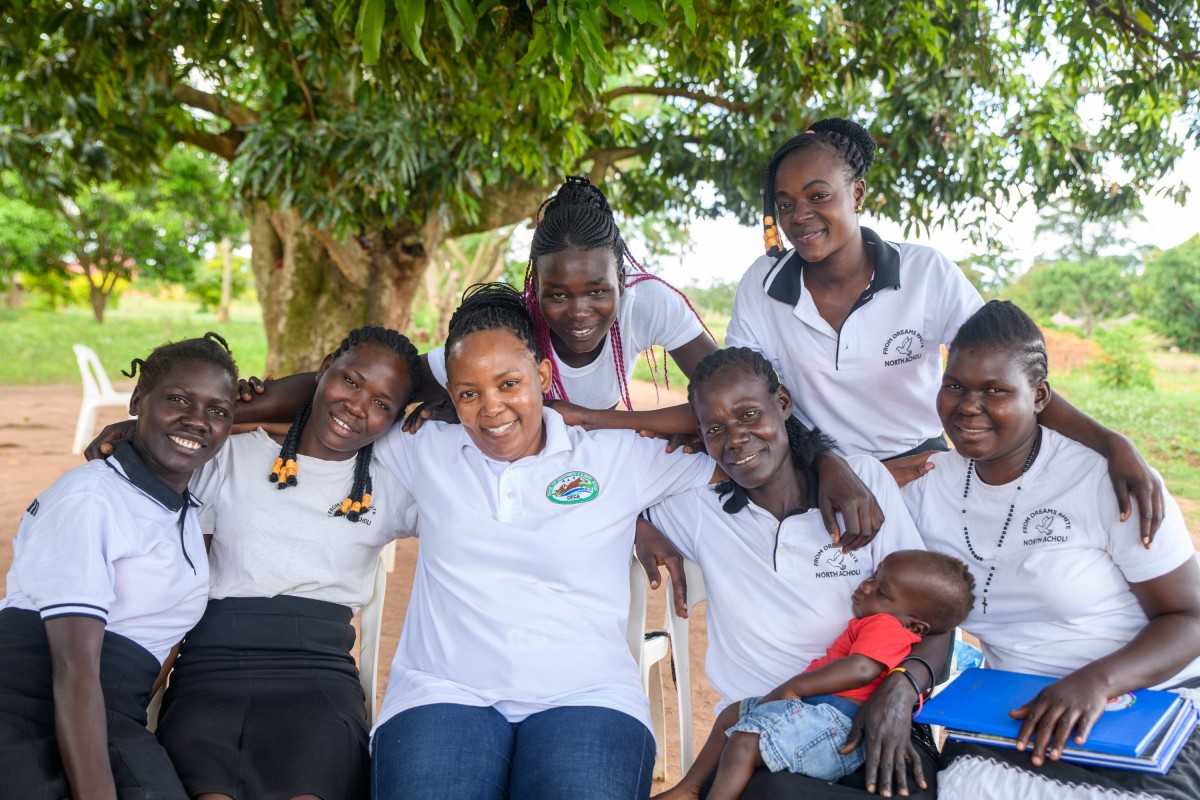Leveraging existing structures to promote and sustain WASH: The story of the Bed ki Gen Dream Girls
The Bed ki Gen Dream Girls in Uganda work on improving sanitation facilities, menstrual health and the income of its members.

Text by Hanifah Kasule
When HEWASA, a local Simavi partner in the WASH SDG programme, wanted to use existing community structures as a basis to start fighting open defecation and to increase the knowledge of menstrual health among schoolgirls, they were keen to work with the Bed ki Igen Dream Girls women’s group.
“In the beginning, our group was only focused on improving the incomes of its members by engaging in four main activities: liquid soap making, bar soap making, chair and tent hiring, and making of reusable menstrual pads” says Victoria Akot, the group’s chairperson. Victoria goes on to explain that now, the group has added a WASH loan to their portfolio, and they are also raising awareness on menstrual health in schools and communities.
How does the Bed ki Gen Dream Girls group operate?
The pads are mainly sold in schools around the village whereas the soap is sold to village members especially on market days. The tents and chairs are hired out to community members that have ceremonies or events. To keep the VSLA operational, members make weekly cash contributions of not less than UGX 2,000 (about Euro 0.5) and an additional welfare amount of UGX 500.
The money is saved in the group’s bank account which has three signatories: the group’s chairperson, the secretary, and the treasurer. Upon assessment of a loan application by the group’s loan committee, a member can borrow up to a minimum of UGX 100,000 and a maximum of UG 500,000, at an interest rate of 10% per month. As of April 2023, the group has accumulated savings of UGX 3,800,000 in the group bank account.
Interesting the group into taking up WASH promotion
At the onset, the intention of HEWASA was to introduce WASH (Water, Sanitation and Hygiene) aspects into the activities of the group, specifically a sanitation loan product. This was because community members had cited affordability as the main reason for not constructing latrines. At that point, the group’s activities did not yet include a big WASH component, besides the making of reusable menstrual pads.
Based on HEWASA’s experience and success of working with sanitation loans, a proposal was tabled to the group to introduce a sanitation loan product for its members. However, it was necessary for groundwork to be laid before such a product could be introduced. This included enhancing the capacity of the group to manage their money and the lending process through trainings on the WASH value chain financing, resource mobilization, credit management, marketing of WASH loan products, and risk management.
According to Josephine Ajalo (33 years old), the group treasurer for the past four years and the first beneficiary of the sanitation loan product, the financial management sessions with HEWASA introduced the group to better ways of keeping their business and financial records which resulted into easier follow-ups of their different business ventures.
By the end of 2022, HEWASA had successfully supported the group to introduce a dedicated sanitation loan product which group members and non-members can access and use to construct latrines for their homes. As of 2023, eight (8) group members have obtained a WASH loan and have used it to construct latrines with washable floors.
Engaging the group on menstrual health in schools
Since the group was already making reusable menstrual pads, HEWASA used that as an entry point to also engage the group on menstrual hygiene management (MHM). Group members were capacitated to talk to the girls in the schools where the pads are sold on proper management of the pads, and to offer trainings on the making of reusable menstrual pads to schools and communities. Where at the beginning group members visited schools with the sole aim of marketing their reusable menstrual pads, now the sessions with the girls have inspired them to continue engaging with them. And currently, they even organize regular sessions on menstrual health. These sessions are conducted in five schools where the average number of pupils per school is 480.
Using existing community structures as a basis for sustainability
The story of the Bed ki Gen Dream Girls demonstrates the importance of leveraging the strengths of existing community structures and strengthening them further to promote WASH. It brings to light an important lesson; instead of investing in creating new structures, it is better to look at existing ones and find entry points through which to engage. This is also a good sustainability strategy for those structures; when new programmes engage and work with these structures and subsequently strengthen them, there is a higher likelihood of those structures remaining operational in the long run.

About Bed ki Gen Dream Girls
The group was started in 2018 in Alupere ward of Kalongo town council in Agago district, under a USAID funded programme. Presently, it has 39 members, and it is registered as a Village Savings and Loans Association (VSLA). The group is managed by a democratically elected committee with the following positions: chairperson, secretary, treasurer, 2 money counters, a two-person loan committee, mobilizer, and 2 timekeepers.
Do you want to learn more about WASH SDG programme? Have a look at the programme page.

